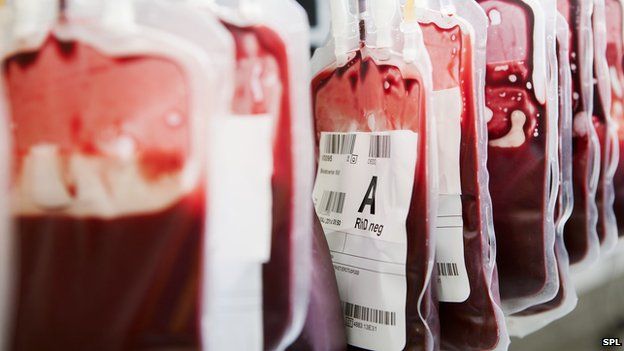Contaminated blood victims 'on the breadline'
 SPL
SPLPeople affected by the contaminated blood scandal "lost everything" and "had to live on the breadline" as they struggled financially, the chairman of the public inquiry says.
In a letter to the Cabinet Office, Sir Brian Langstaff said "decisive action" was needed over the support available.
There is a variety of schemes running across the UK.
Sir Brian said he was concerned about what he heard during the preliminary hearings, which started last month.
The inquiry is expected to last more than two years and is looking into how thousands of people in the 1970s and 1980s were given blood products infected with hepatitis viruses and HIV, and the impact this had on their families.
It will also examine whether there has been any attempt to cover up the scandal.
In his letter to Cabinet Office Minister David Lidington, Sir Brian wrote: "You should be aware that there were considerable concerns during the preliminary hearings about access to and variations in financial support and psychological support, and also concern that not everyone who was infected has been identified.
"During the Commemoration people were heard asking 'where is the compassion?' and describing how they had 'lost everything', had to 'live on the breadline' and 'feel betrayed'.
"Throughout the preliminary hearings there were repeated calls for financial assistance which fully recompenses individuals and families for the losses they have suffered.
"One of the legal representatives said: 'Recently there have been changes to the way in which these funds are administered, but any suggestion that this represents proper compensation for the hurt they have, they are and will continue to suffer, is met with anger and indignation.'
"Decisive action on this matter should be taken and communicated to those affected at the earliest opportunity."
Payments can range from under £5,000 a year to more than £36,000.
A Cabinet Office spokesman said the inquiry is a "priority" for the government.
He said ministers were "considering the letter" and would reply "in due course".
What is the infected blood scandal about?
About 5,000 people with haemophilia and other bleeding disorders are believed to have been infected with HIV and hepatitis viruses over a period of more than 20 years. Nearly 3,000 of them have since died.
This was because they were injected with blood products used to help their blood clot.
It was a new treatment introduced in the early 1970s. Before then patients faced lengthy stays in hospital to have transfusions, even for minor injuries.
Britain was struggling to keep up with demand for the treatment - known as clotting agent Factor VIII - and so supplies were imported from the US.
But much of the human blood plasma used to make the product came from donors such as prison inmates, who sold their blood.
The blood products were made by pooling plasma from up to 40,000 donors, and concentrating it.
People who had blood transfusions were also exposed to the contaminated blood - as many as 30,000 people may have been infected.
By the mid-1980s the products started to be heat-treated to kill the viruses.
But questions remain about how much was known before this, and why some contaminated products remained in circulation.
Screening of blood products began in 1991 and by the late 1990s, synthetic treatments for haemophilia became available, removing the infection risk.